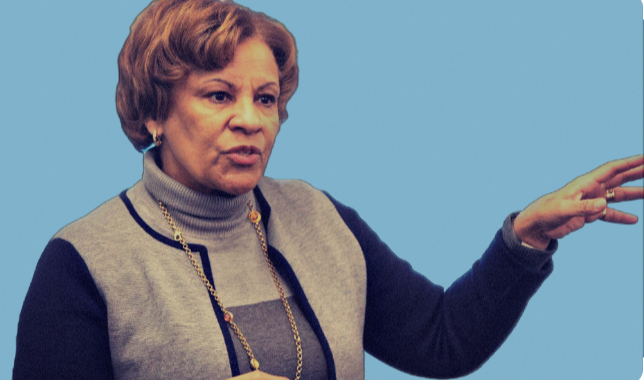The Black liberation struggle is literally in the DNA of Spelman College. Founded specifically to educate Black women, the school is named for an Ohio couple who helped the enslaved reach freedom and whose daughter, Laura Spelman Rockefeller — wife of wealthy industrialist John D. Rockefeller — was an early benefactor.
Indeed, most undergraduates and alumnae see the Atlanta campus as a haven from white supremacy, and patriarchy, in higher education. Therefore, it’s easy to assume that racial truth-telling and reconciliation are non-issues.
But Dr. Cynthia Spence, a sociology professor at Spelman, says her students are affected by the insidious forces of racism, classism, and homophobia, and often don’t realize it. While Spelman’s sisterhood culture is strong and supportive, she says, toxic forces surface in unexpected ways — including young Black women showing bigotry towards one another.
“Even at a place like Spelman College, you still have these external structural forces that regulate the lives of individuals and tend to define them,” Spence says. “We engage in a lot of discussions amongst students around these issues that can cause friction.”
That’s why Spence and Spelman became early adopters of the Truth, Racial Healing and Transformation framework, a program designed to promote grassroots dialogue. The goal is to reverse centuries of racial trauma through education, empathy, and finding commonality between individuals and groups.
Developed by the W.K. Kellogg Foundation in 2016, the TRHT program uses facilitated dialogue, workshops, and exercises to help participants connect with one another. Spelman is among the 71 colleges that have created TRHT Campus Centers, spaces dedicated to preparing the next generation of leaders to make effective change.
Spence says some of the discussions around the intersection of race, class, and sexual identity at Spelman had been taking place before she launched one of the first TRHT Campus Centers in 2018-2019. Embedded in Spelman’s Social Justice Fellows Program, the TRHT Campus Center gave a boost to the discussions, adding structure and increased focus.
Although the student body consists of young Black women, there is diversity among lived experiences, Spence says.
It’s important not to assume that all Black people, or all Black women, have the same racialized experience.
DR. CYNTHIA SPENCE
Some came to Spelman from posh, predominantly white communities, for example, while others came to Spelman having lived hand-to-mouth in poor Black neighborhoods, having next to no contact with white people.
Still others have backgrounds that include migration to the U.S. with little knowledge of racism — but believing negative stereotypes about Black Americans. And sexual orientation, Spence says, can be a hidden yet contentious issue.
While they ostensibly have race and gender in common, Spence says, Spelman undergraduates have a broad spectrum of attitudes and traumas about race, class, and sexual identity, largely rooted in white supremacy. Those thoughts, she says, can lead students to prejudge or have conflicts with classmates whose lives — and beliefs — aren’t like theirs.
“It’s important not to assume that all Black people, or all Black women, have the same racialized experience,” Spence says. “Many times, those differences divide us because we just don’t have the knowledge” or empathy about others’ experiences.
Spence recalls an early TRHT session in which she invited Spelman undergraduates, and some white faculty members, to a racial healing circle she arranged at a nearby independent-living home for Black seniors. When the time came for prompts to start the conversation, the professor pulled no punches.
“My first question was, ‘When did you first realize that race matters?’” Spence says. “The seniors were talking about their history of being discriminated against — families moving from the South to the North, because of racism.
We are not monoliths. Our students represent so many different backgrounds, as do our faculty.
DR. CYNTHIA SPENCE
Coming to visit the South and going to auntie’s houses and crosses were burned in their yards. Students talked about being the only black kid at their white school, and what that felt like.”
“It was just a beautiful, beautiful experience,” she says. For the white faculty, “it was illuminating. In some ways, it was uncomfortable as well.”
Building on that experience, Spence plans to take the TRHT program to the next level, with field trips planned to Charleston, South Carolina. and Savannah, Georgia — two major port cities that were central to the slave trade. Residents of both places are wrestling with racial trauma and divisions that have gone unaddressed for generations.
HBCUs “need to do this work as well,” Spence says. “We are not monoliths. Our students represent so many different backgrounds, as do our faculty. So it is important that we take on a leadership role, and have these discussions about race and transformation, because that’s what we do. We’re in that business.”
This series was produced in partnership with the W.K. Kellogg Foundation.


